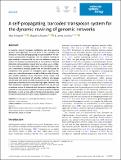A self‐propagating, barcoded transposon system for the dynamic rewiring of genomic networks
Author(s)
English, Max A.; Alcantar, Miguel A.; Collins, James J.
Download44320_2023_Article_BFMSB202211398.pdf (5.114Mb)
Publisher with Creative Commons License
Publisher with Creative Commons License
Creative Commons Attribution
Terms of use
Metadata
Show full item recordAbstract
In bacteria, natural transposon mobilization can drive adaptive genomic rearrangements. Here, we build on this capability and develop an inducible, self‐propagating transposon platform for continuous genome‐wide mutagenesis and the dynamic rewiring of gene networks in bacteria. We first use the platform to study the impact of transposon functionalization on the evolution of parallel Escherichia coli populations toward diverse carbon source utilization and antibiotic resistance phenotypes. We then develop a modular, combinatorial assembly pipeline for the functionalization of transposons with synthetic or endogenous gene regulatory elements (e.g., inducible promoters) as well as DNA barcodes. We compare parallel evolutions across alternating carbon sources and demonstrate the emergence of inducible, multigenic phenotypes and the ease with which barcoded transposons can be tracked longitudinally to identify the causative rewiring of gene networks. This work establishes a synthetic transposon platform that can be used to optimize strains for industrial and therapeutic applications, for example, by rewiring gene networks to improve growth on diverse feedstocks, as well as help address fundamental questions about the dynamic processes that have sculpted extant gene networks.
Date issued
2023-03-27Department
Massachusetts Institute of Technology. Department of Biological Engineering; Massachusetts Institute of Technology. Institute for Medical Engineering & ScienceJournal
Molecular Systems Biology
Publisher
Nature Publishing Group UK
Citation
Molecular Systems Biology. 2023 Mar 27;19(6):MSB202211398
Version: Final published version